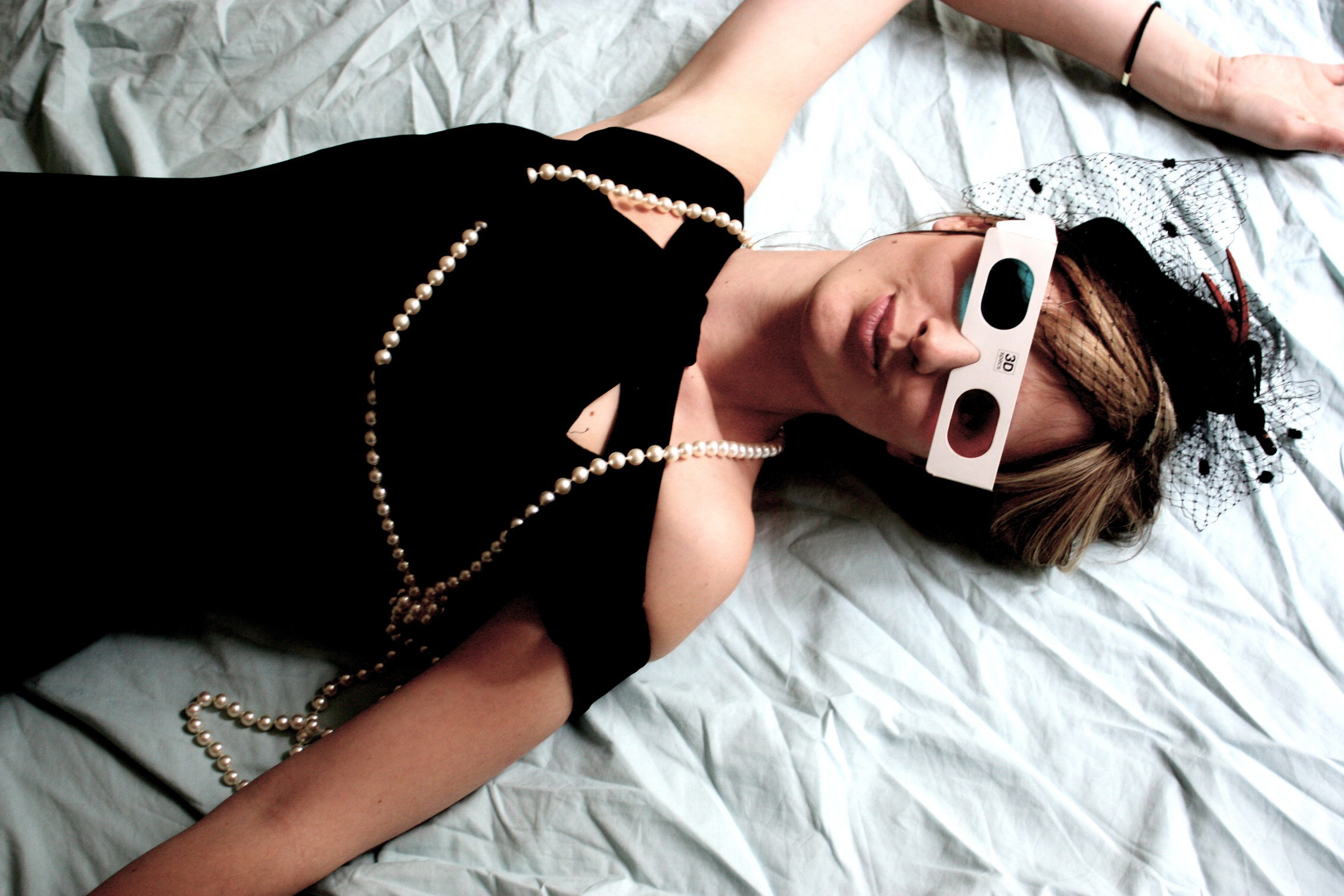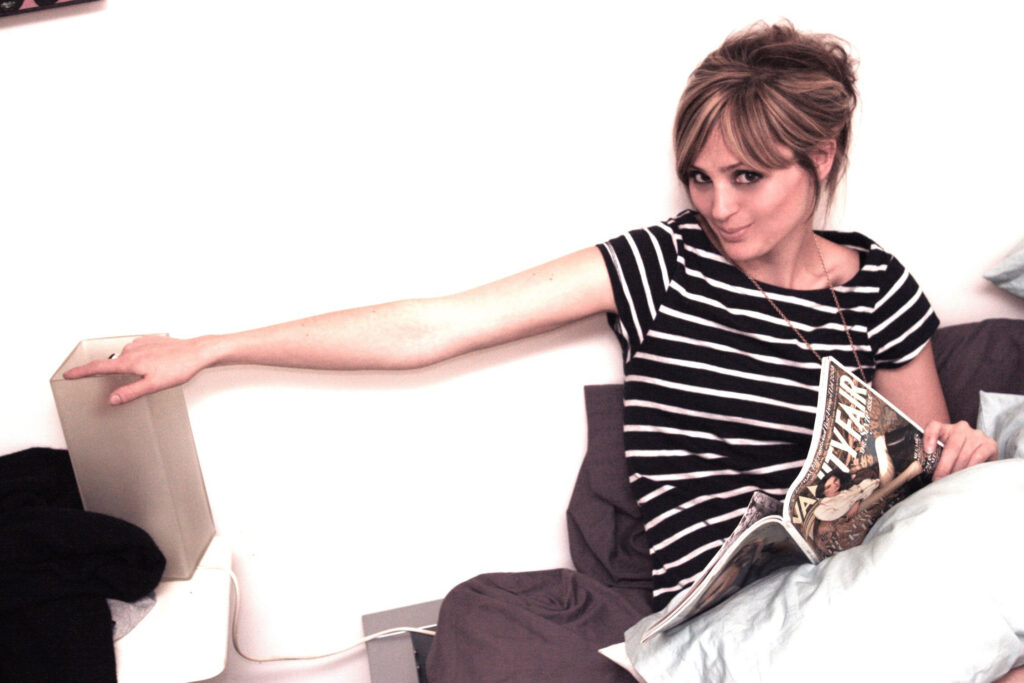Think what you like about George Pringle, but she’s clearly a woman who’s not afraid of a little pretension. She describes herself as a diseuse (a female performer of monologues) and her spoken word avant-electro vignettes have already created a formidable online thrum. In the process, she’s also managed to arouse suspicion and vitriol in the blogosphere and on internet message boards for the apparently heinous crime of being young, female and a bit posh. But debut album Salon Des Refusés should help silence detractors. It is a witty, dreamily cinematic and consummately dance music literate record created exclusively on the home-studio software GarageBand. It’s a world away from the tame synth-pop retreads which pass as cutting-edge these days and also very unlikely to garner favour with the Mercury Prize panel anytime soon: and that, if nothing else, is something worth savouring.
Hi George. Last.fm lists you as a top diseuse artist alongside Marlene Dietrich and Anna Karina. That’s pretty illustrious company you’re keeping!
George Pringle: Yes, well they’re lucky to be with me, you know. We have a ball.
Isn’t this casual adoption of an obscure and ever-so-slightly pretentious French term just grist to the mill of your detractors though?
GP: I suppose one could view it that way. It’s equally a descriptive term. You can read it how you will and how you want and there’s the fun in it.
To the uninitiated, can you explain how GarageBand works and why you’re so enamoured with it?
GP: GarageBand is very simple really but it’s quite hard to make something interesting on. And the challenge lies therein and I like challenges because I’ve never been a "musician" per se. I don’t use GarageBand in the same way a lot of people do though. I like making life harder for myself because I use musical typing (where you type the notes on your keyboard) and the pinhole mic. Pretty much the whole album was recorded on the pinhole mic on my Mac and I get a real kick out of that so I suppose it’s all a bit conceptual. Some people think that GarageBand is too primitive to record on but I beg to differ.
As a tool for composition it’s great and being slightly limited can work in your favour. Nobody says that composing on a guitar is too primitive, but there is a school of thought that believes that GarageBand is too primitive to record on. I don’t think they should be too snobbish about software. I like the fact that GarageBand is on every Mac when you buy it, so anyone can have a go without having to invest in lots of equipment. I mixed the record in Logic using a mixing desk which I was fortunate to be able to do. I put some of the parts back through analogue and got to use various reverb plates and tape delays which was really fun. To me, beginning with GarageBand will always feel like the most natural way to start writing, especially since I know the software really well now. It’s like a notepad or sketch book.
To me, Salon Des Refuses sounds less like a conventional record and more like a piece of conceptual art – do you find the boundaries between the two becoming increasingly blurred?
GP: I’ve always intended for it to be that way really. I didn’t want the record to just be music. I wanted it to be more ambitious.
One of the things I like about the record is that its influences are not easily identifiable. What music were you listening to during recording of the album?
GP: The album took three years to write. It’s [constructed of] snippets from a three year period from when I was at university to moving back home to London. So, naturally, my musical tastes changed a lot over that period. I was listening to a lot of fairly drippy indie-ish stuff at University and then through such an anaemic musical diet, I became hungry and went in search of some steak. The quest lead me to a lot of DFA Records and Disco which was revelatory because I had lost the understanding that music can make you happy, it can be sonically cheering. Then I found lots of text book stuff, the more melancholic electronics, sound-tracky stuff like M83 and Giorgio Moroder which were probably bench marks for me, musically. From there I went on to listen to Ricardo Villalobos in a big way towards the end of my time at university. I also rediscovered Human League and Pulp which was a little thrill because I was old enough to understand them.
Then I moved back to London and my brother had moved back from India and we were reunited as he was living above me and he honestly has the best music taste in the world so he was throwing all this stuff at me and I had no idea what the names of the artists were. There was something quite naive and fun in that. I have all these CDs with no track titles on that he made me. Now I realise that what I was listening to was Arthur Russell, Augustus Pablo and Tony Allen, Morgan Geist, some Italo Disco, Ethiopian Soul…and then I discovered those Soul Jazz New York Noise compilations. I can always rely on Patrick to open my eyes because I don’t really buy music. I’m not such a train spotter. I don’t seek music. My musical experiences have been a kind of osmosis. When I was a teenager I would go to Fabric in school holidays with Patrick, stone cold sober and listen to the music (D & B mainly) and not understand it or the culture but I enjoyed it and I think that those experiences were more formative than I may have realised at the time. I’m quite nostalgic about those early experiences because I led such a cloistered existence. It was very freeing. I listen to a lot of ABBA too, for what it’s worth.
There seems to be a lyrical preoccupation with adolescence on tracks such as ‘Physical Education’ and ‘Sparkomatic Miami’. Is this a period of your life you draw particular inspiration from?
GP: Absolutely, although ‘Sparkomatic Miami’ is about childhood not adolescence. I think that being a teenager is a very powerful point in life. I think in a way I felt like I was missing out on all the typically Teenager-ish things that teenagers get up to when I was a teenager. I was stuck in boarding school, watching Heathers and Top Gun every weekend instead of going to parties because we weren’t really "let out". It was fairly miserable to think of all the things you could be doing at 7pm on a Saturday night when you’re sixteen. I felt a bit like a prisoner. My friends and I would just fancy dress and take photos to pass the time so you can see why I took to MySpace like a duck to water. I had a lot of time to think. The experience has stayed with me and I remember it very clearly. That isolation has influenced my work.
You clearly give quite a lot of yourself away in your songs. Has this candour ever backfired on you personally?
GP: I would be lying if I said that I hadn’t confused myself at times but I feel a sense of achievement in being honest and creating things and saying things a lot of people wouldn’t have the guts to or know how to articulate. That’s what we are here for, as musicians and artists. It’s a cliché: suffering for your art but there’s a degree of truth in all that. To be honest, I think I understand myself better through creativity. And, you know, I have a sense of humour about myself. If you don’t think that you are hilariously ridiculous to some capacity you will end up a wounded individual. Rip yourself to shreds.
It seems that any female artist trying to break into the music industry is in a constant battle to defy lazy pigeon-holing. Is this frustrating?
GP: No. At first I thought it was but it isn’t. I think it’s important not to get a complex about such issues as I once used to when I was starting out. They can either pigeon hole you or they can’t. They don’t seem to be able to with me. So, neither fish nor foul, surf nor turf…It’s a good thing. If you’re in it for the ride, you have time to clear yourself some space and the aim is to eventually get people to engage with and understand what you are doing without lazy comparison. That’s a little utopian, I realise.
The web 2.0 DIY explosion has obviously had a huge impact on your career: do you agree with the contention that the internet has democratised the music industry?
GP: It has really. I mean there’s a lot of rubbish music on the internet but no more than in the mainstream music industry. On the internet, when you find a pearl, it’s worth it. Because it’s a shout in the dark. You really feel like this artist is yours and you really want to support them because sometimes a lot of stuff on the net doesn’t get the recognition it deserves. Although, on the other hand, you might never have heard this stuff without the internet.
Your music appears intrinsically steeped in blogging culture and the social networking phenomenon. On a wider level, do you think the prevailing obsession with the minutiae of everyday life is healthy?
GP: No. It’s not. I don’t have Twitter because of that. I’m obviously a very vocal online character but I think Twitter is just one step beyond. With a lot of famous people too, the more insight you get into their brain, the worse they appear. Especially when they can’t spell properly. Note Bene: I cannot spell. I don’t have Twitter.
Virtually every article I’ve read about you alludes to your "poshness". Do you ever feel like a victim of inverse snobbery?
GP: Not really. I never considered myself terribly posh until people started mentioning it. I don’t have a pony or the right number of hands for a horse. My parents work very hard. I’m not inbred gentry, so I find the whole thing quite amusing. "Bag yourself a posh Pringle" Did you see that advert? It killed me. Basically it’s my fault for speaking BBC English. It’s like OCD with words. I need to enunciate or something disastrous will happen…
Get George’s album fromAmazon.co.uk or iTunes




